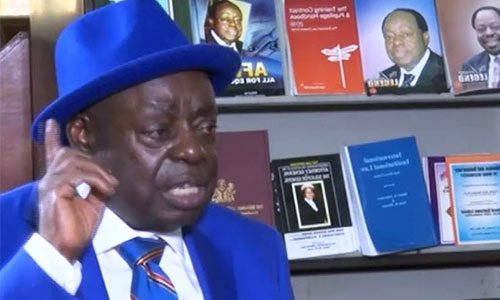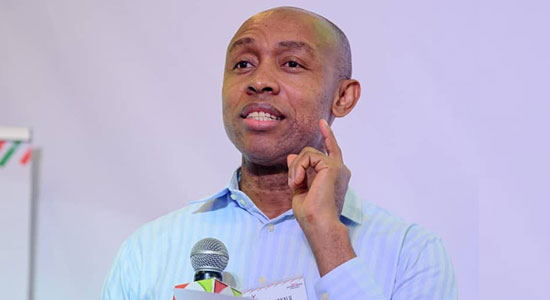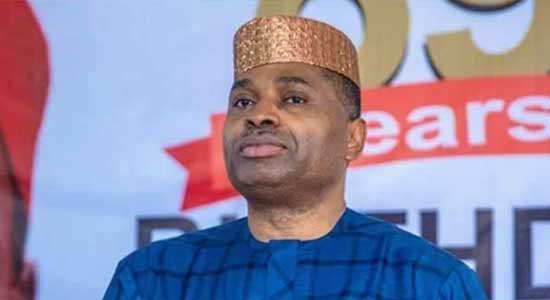Democracy Day Celebrations: Significant Highlights From President’s Speech

NATION which practice democracy usually set aside a day – termed Democracy Day – to commemorate the qualities that make democratic governance the most desirable form of governance; to celebrate inherent characteristics of democracy such as the rule of law, freedom of thought, protection of human rights, respect for minority rights, constitutionalism, and the notion of having periodic elections. Therefore, the celebration of Democracy Day is a deliberate endeavour to improve democracy by examining how closely an existing democratic administration has matched those principles in nature and character.
Nigeria’s Democracy Day is celebrated every 12th of June; it is a day earmarked in remembrance of the annulment of the June 12, 1993 Presidential elections which saw a massive turn out by Nigerians to vote the candidate of their choice – MKO Abiola; but which results were annulled by the military government about two weeks after. But beyond being a national holiday, June 12 will forever be entrenched in the memories of Nigerians as the day which the military government decided to deny the masses the chance of being governed by the widely accepted candidate of their choice. Undeniably, June 12 is one of the most significant days in Nigerian history – a day of sombre contemplation on the tragic annulment of arguably the nation’s freest and fairest election.
Much more than the gloomy reality which June 12 epitomises; it equally conveys a message of hope for a better Nigeria. It is a day which symbolises the power which the people hold in determining their choice of leadership in democratic governance. It is a constant reminder that true democracy lies in the hands of the governed. Therefore, the decision of the current administration in 2018 to change Nigeria’s Democracy Day to June 12 was highly laudable. As is customary on every June 12 Democracy Day celebration, the President of the Federal Republic of Nigeria would address the nation, and this year’s remembrance was no different. One of the most important highlights of President Muhammadu Buhari’s 2022 Democracy Day speech, particularly ahead of the 2023 general elections, was his emphasis on the need for politicians to adopt issue-based campaigns. Mr. President noted as follows:
“I followed the party primaries closely from the state level to the Presidential level. I was very impressed to see across all the political parties that, most candidates ran issued-based campaigns. The language and tone throughout were on the whole measured and controlled… I will therefore take this opportunity on this very special day to ask all candidates to continue running issue-focused campaigns and to treat opponents with dignity. As leaders, you must all showcase high character and never forget that the world is watching us and Africa looks up to Nigeria to provide example in governance. The tone you set at the top will surely be replicated in your followers.”
The electioneering process in Nigeria has more-often-than-not marked by skirmishes usually among supporters of leading political parties who resort to tearing down of campaign posters, invasion of party offices, destruction of lives and properties in a bid to intimidate the members of the opposing camp. Notably, after the elections, these acts of violence recede, only to be revived after another four years. Unfortunately, the politicians on whose behalf these zealots unleash mayhem do not openly discourage these acts, but instead, use their campaign platform to embark on a mudslinging spree against real and perceived political opponents. Just as in the litigation process where parties win a legal battle based on the strength of their own case and not on the weakness of the opposition’s case, the politicking process in Nigeria ought to be premised on political parties’ emphasis on issue-based campaign – for politicians use the campaign period to sell themselves and their ideas to voters, and in turn, for voters to evaluate candidates and decide whether or not they will vote for them. I could recall that prior to the general election of 2015, all the presidential candidates signed a peace pact in Abuja wherein they resolved, among others, to engage in issue-based campaigns. However, the reality of that pact remains much to be seen today, particularly as politicians have never ceased to resolve to age-old slander tactics.
Issue-based campaigns, particularly in developed democratic nations, carries utmost significance at every period of elections. To this end, campaigns in the United States attract adequate and elaborate preparations. Professional firms, for example, exist in the United States to assist candidates in organizing their campaigns. To accomplish this, candidates frequently obtain comprehensive voter data, which includes information that allows the candidate to devise strategies for persuading potential voters of his suitability for the desired position. As a result, if the data indicates that the electorate is primarily made up of women or unemployed youth, the candidate will devote some of his strategies to issues affecting women and employment. President Barack Obama and Senator John McCain focused on several issues during the campaign for the November 2008 presidential elections in the United States, including unemployment, inflation, and foreign policy, which, according to data available to them, were of utmost importance to the electorates.
According to a report on Gallup, Republicans and Democrats agree on the importance of the presidential candidates’ positions on the economy, terrorism, jobs and healthcare. Beyond these, however, the two partisan groups differ significantly on the importance they assign to other campaign issues. To the Republicans, issues relating to federal budget deficit, foreign affairs, the size and efficiency of the federal government, immigration and taxes carry more focus than to the Democrats. On the other hand, Democrats focus largely on issues relating to climate change and the distribution of income and wealth in the U.S. In Nigeria, however, experience has shown that campaigns are frequently used to divert attention away from issues that deserve it and toward negative issues that should not be the focus of any serious election campaign. Perhaps one of the limiting factors to the development of issue-based campaigns is the short campaign time as provided under the extant Electoral Act. The short time allowed by law for campaigns in Nigeria, in my opinion, has greatly aided this development. According to Section 94(1) of the Electoral Act 2022, campaign elections begin 150 days before the election and must end 24 hours before the election (as amended). While this 150-day period may be adequate for candidates for State Houses of Assembly, National Assembly, and possibly even Governorships of States to canvass their political constituencies and persuade voters to vote in their favour, I doubt it will be adequate for presidential candidates to canvass the length and breadth of Nigeria and launch meaningful campaigns.
Therefore, the 150-day campaign limit should be reconsidered by the National Assembly, especially in presidential elections. A six-month campaign period, in my opinion, will greatly aid Nigerians in properly evaluating candidates and asking them and their political parties questions about their plans for the country. It is not good for democracy for candidates to be limited to a short period of time, with only brief stops in some states, with the result that Nigerians may not even know the candidates well enough on election day. While recognising that there are other steps which need to be taken to ensure that campaigns in Nigeria as issue-based, the revisiting of the campaign period provided by the Electoral Act 2022 (as amended) would certainly be a step in the right direction.
AARE AFE BABALOLA, SAN, OFR, CON



